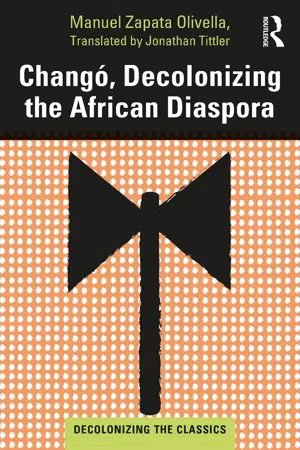
- 396 pages
- English
- ePUB (mobile friendly)
- Available on iOS & Android
Changó, Decolonizing the African Diaspora
About This Book
The crowning achievement of Afro-Colombian author Manuel Zapata Olivella, Changó, Decolonizing the African Diaspora depicts the African American experience from a perspective of gods who stand over the world and watch.
The centennial anniversary release of this ground-breaking postcolonial text remains a passionate tour de force to make sense of our past, present, and future. A new introduction by Professor William Luis positions the book in contemporary politics and reasserts this book's importance in Afro-Spanish American literature. Ranging from Brazil to New England but centered in the Caribbean, where countless enslaved people once arrived from West Africa, this book recounts scenes from four centuries of involuntary displacement and servitude of the muntu, the people. Through the voices of Benkos Biojo in Colombia, Henri Christophe in Haiti, Simon Bolivar in Venezuela, Jose Maria Morelos in Mexico, the Aleijadinho in Brazil, or Malcolm X in Harlem, Zapata Olivella conveys, in luminous verse and prose, the breadth of heroism, betrayal, and suffering common to the history of people of African descent in the Western hemisphere.
Readers and critics of postcolonial literatures will relish the opportunity to experience Zapata Olivella's masterpiece in English; students of world cultures will appreciate this extraordinary tapestry, woven from equal strands of myth and history.
Frequently asked questions
Information
Part One
Origins
Land of Ancestors
The Orichas: Let the Kora Sing
Shadows of My Elders
Ngafúa Recalls the Unbreakable Bond between the Living and the Dead
Invocation to the Great Orichas
Table of contents
- Cover
- Half Title
- Series
- Title
- Copyright
- Contents
- Series Editor’s Preface
- Acknowledgments
- Introduction
- To the Fellow Traveler
- Part One Origins
- Part Two The American Muntu
- Part Three The Vodou Rebellion
- Part Four Rediscovered Bloodlines
- Part Five Ancestral Combatants
- Book of Navigation: Mythology and History